Near the top of Liteiny Prospekt and close by the south bank of the River Neva, Peter’s Big House is an enormous six-storey building that occupies the whole block between Vionova Street and Kalajeva Street. Presumably there must have been an architect although, as with most of the modern buildings in this country, it is difficult to see how. Imagine two huge squares of cheese (and in Moscow these days, imagining cheese is as near as one actually gets to it) one red, one yellow, lay the first on top of the second and you have an idea of what it looks like. Something forbidden and inhuman anyway, and that I suppose was the whole of the architect’s idea: to render the individual insignificant. This was an impression enhanced by the size and weight of the front door: as tall as a tram and almost as heavy, it would have been hard to enter the Big House without being overawed by the power of the State and those who, theoretically anyway, enforced its laws.
We flashed our identity cards to the militiaman on guard inside the door, ignored the empty cloakroom and crossed an entrance hall that looked as if it belonged to a public swimming baths.
At the top of the first flight of stairs Felix Dzerzhinsky’s head occupied a plinth on his own personal mezzanine. If ever a man was destined for bronze it was Iron Felix who, in 1917 at Lenin’s request, organised the Cheka. In 1923 this became the OGPU that, in 1934, became the NKVD that was the forerunner of the KGB, which will now be disbanded and called something else again. (If this country leads the world in any kind of manufacturing it is surely in the production of abbreviations and acronyms.) Until the Second Russian Revolution of August 1991 there were statues of Iron Felix all over the USSR. Now the only place you were likely still to find him was in the local Big House. Whatever his politics, he was a good policeman.
Grushko’s office was on the second floor, at the end of a wide and dimly lit corridor. As a full colonel in the Criminal Services Department he had a good-sized office. There were whole families living in less space than that.
Criminal Services was part of the Central Board of Internal Affairs that occupied these first two floors. The upper four floors were the KGB’s. The office next to Grushko’s belonged to General Kornilov, the head of the Criminal Services Department and acting head of the Central Board of Internal Affairs in St Petersburg. This meant that Kornilov was also head of the Central Investigating Department and that he was not only Grushko’s boss but mine as well.
People often ask me to explain the difference between the two departments — Criminal Services and Central Investigating — and to tell them which of them is more important, the detective or the investigator. Sometimes I think that these things seem complicated only because of how these two jobs are perceived in the West. I can’t say how officers work outside the New Commonwealth but here, an investigator is in charge of how an indictment is prepared for the Prosecutor’s Office. It’s surely a very old argument which of them, the detective or the investigator, is more important, but it’s a kind of typically Russian argument in that there is no right or wrong answer. It’s not something that excites me very much, but then everyone is different. You scratch where it itches, as the saying goes. Detectives say that an investigator is never properly a policeman until he has tasted a criminal’s fist. Generally it’s best to say that within the whole forensic process the relationship between investigator and detective is one of cooperation between peers; and since both hold a military-style rank according to experience, things are usually fairly clear-cut. I am a lieutenant-colonel; and I have a small scar on the underside of my chin to prove that I have indeed had a taste of a criminal’s fist.
Grushko’s department, with which I was to liaise exclusively, investigating organised crime, was a relatively recent creation and did not yet operate at a federal level, although the existence of a Soviet Mafia had been well-known since 1987.
When we talk about the Mafia this is just an easy way of describing gangs of organised criminals. So far as Grushko knew there was no connection between them and the Mafia that existed in Italy and America. And whereas those gangs tended to be run along family lines, in Russia the gangs were often racially constituted — Ukranian, Byelorussian, Georgian, Chechen, Ukrainian, Armenian, Tazhak, Azerbaijani, Kazakh — people from what used to be the southern republics of the Soviet Union.
Like most inhabitants of northern Russia Grushko called them churki — people from the swamps — even though his name and downward-slanting eyes seemed to indicate that there was something of the Cossack in him. He could certainly drink more than any man I ever met. But to come back to our original flock of sheep, the churki were very different from their Italian-American counterparts. The suits they wore were not particularly well cut and they drove Zhigulis instead of large Cadillacs, although a few did own Mercedes. They tended to be younger men, often physically well endowed from years in state-subsidised sport — or a labour camp. But while the Russian Mafia may not have lived as well as its Western stereotypes, it was just as ruthless.
If I had needed reminding of this I found myself quickly prompted by Grushko handing me a file of photographs almost the minute I set foot in his office.
‘Take a look at this little album,’ he said. ‘This is what happens to a cash-cow who holds out on her pimp.’
I am not a squeamish man. Even so the day needed to be a little older before I was ready to dwell on the various injuries that had been inflicted on the body of a seventeen-year-old prostitute as a precursor to her being drowned in a bucket of water. Perhaps if I had slept better on the overnight train from Moscow I could have put up more of a show of interest. As it was I glanced through the photographs, nodded quietly and then returned them without a word.
‘Just one of the cases we’re dealing with at the moment,’ Grushko said with a shrug. ‘We know who did it: an Armenian they call the Barrel. He’s an old customer.’ He tapped the window-pane with his fingernail. ‘One of the frozen-minded. Oh, you’ll get to meet them all, my friend.’
I took out my cigarettes and came across the parquet floor to the dirty window with its cheap yellow curtains to offer him one. He took one into his thin lips and lit us both with a handsome gold lighter.
‘That’s rather elegant,’ I said, wondering how a policeman on Grushko’s salary could afford such a luxurious-looking object.
‘From the Swiss police. We get all sorts of delegations coming to see us from Interpol nowadays. Tourists mostly, like all the rest of them. They come to spend their dollars and make sympathetic noises and then they go home again. Funny thing, though, wherever they’re from, they always buy me a gold lighter as a thank you. Must be something about cops the world over. Mind you, it’s just as well. I’m always losing them.’
The phone rang and while he was answering it I looked out of the window at the street below. Housewives were heading to the shops, crowding on to an already overcrowded trolley bus. They were none too gentle about it and for a moment I entertained myself with the thought of my ex-wife doing the very same thing somewhere in east Moscow.
I turned away and looked back at the room: Grushko’s desk with its self-important array of telephones; on the wall, the huge map of St Petersburg with all twenty-two districts neatly marked out like cuts of meat; in the corner the huge safe containing Grushko’s files and papers and, standing on top of this, a cheap plaster statue of Lenin, like the one I had left in my own office in Moscow; the line of chairs neatly ranged against the far wall; the fitted cupboard with its own wash-hand basin and coat hook; and the colour television set on which a girl was performing gymnastic exercises. I didn’t know it then, but the story had already started.
Читать дальше












